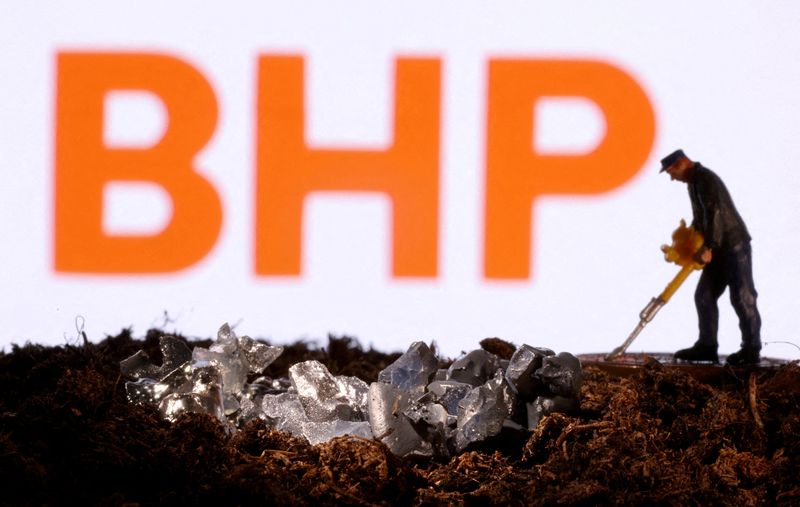By Melanie Burton and Scott Murdoch
SYDNEY (Reuters) -BHP Group investors welcomed the top global miner's decision to walk away from a $49 billion plan to take over Anglo American (JO:AGLJ), which rejected three proposed offers from its bigger rival over the past six weeks.
BHP's decision to withhold a binding bid came after Anglo said it would not grant the Australia-headquartered mining group a further extension to iron out details of a deal that called for Anglo to first spin off its South African assets.
The developments ended a tense standoff between the two global mining giants and negotiations in which shareholders warned BHP not to pay too much to secure control over Anglo.
"It was one of the best opportunities out there for them and it was always going to be hard to complete. I applaud them for showing discipline," said Andy Forster, senior investment officer at Argo Investments, which holds BHP shares.
BHP's timing was good but the complexity of the deal requiring demergers and a copper price rally made it difficult to execute, Forster said.
While BHP's Australian-listed shares fell 1.75% on Thursday, they were in line with its peers.
Winning the Anglo deal would have been a career defining victory for BHP CEO Mike Henry, who has reshaped the company since moving into the top job in January 2020, including buying copper producer Oz Minerals for $6.4 billion last year.
"I don’t think it reflects badly on Mike Henry and BHP. It was an opportunistic bid and one that made a lot of sense," said Matthew Haupt, lead portfolio manager at Wilson Asset Management, a BHP investor.
WHAT NEXT FOR BHP
BHP aimed to win control of Anglo's prized copper assets in Latin America and increase access to a metal central to the global shift towards clean energy and electric vehicles, as well as its metallurgical coal assets in Australia.
"As investors, it wasn’t obvious that the proposed deal was very accretive. Yes it would bring more copper to the portfolio, but depending on what they paid for it, it's not necessarily accretive to the share price," Pendal Group portfolio manager Brenton Saunders said.
BHP's tilt at Anglo reflected a growing preference among miners for buying over building assets to grow, given rising costs for developing new mines and a blowout in timelines for regulatory approvals, mining industry sources in Perth said. Building a new mine now averages more than 16 years, according to figures from S&P Global (NYSE:SPGI).
"Clearly they remain acquisitive and will be sifting through their other targets for building out the copper portfolio," said John Milroy, a private client adviser at Ord Minnett.
BHP could target London-listed Antofagasta (LON:ANTO) or Canada's Lundin Mining (TSX:LUN), which both have copper assets in northern Chile where BHP has its Pampa Norte operations, said RBC (TSX:RY) analyst Kaan Peker.
"Anto is the one that screams the most synergies...but they are very expensive. Most of these you’re going to pay a large premium, so you have to have a lot of synergies to justify it," he added.
BHP declined to comment.
Instead of chasing Anglo, Pendal's Saunders said BHP will have to revert attention to its own growth opportunities in Pilbara iron ore and copper in South Australia and Chile, and hopefully lift dividends.
If it wants to go for Anglo, BHP now has to wait six months before it can approach the company again under British corporate laws. It can return sooner if a new party bids for its takeover target.
After BHP scrapped its proposal, Anglo said it was fully focused on delivering plans it has set out to increase value to shareholders, including divesting its less profitable assets to focus on expanding copper output.

Anglo's shares closed 3% lower at 24.80 pounds in London trading on Wednesday.
"BHP will bide its time for six months and see how investors agitate on the Anglo side," Peker said.